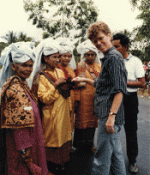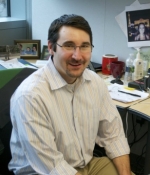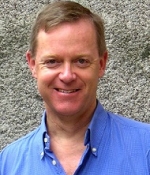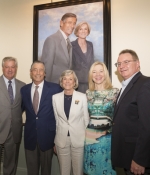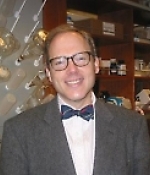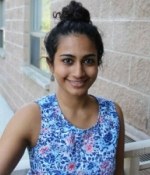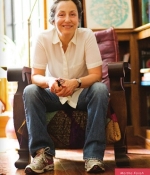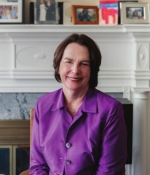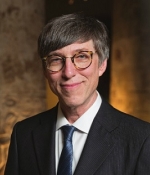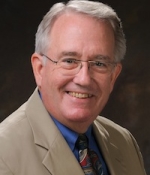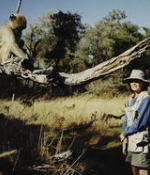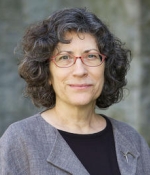2015
Two Endowed Professors Named in Penn Arts and Sciences
Dean Steven Fluharty is pleased to name two faculty members to endowed chairs in the School of Arts and Sciences.
Political Science’s Daniel Hopkins Honored With Two Awards
Daniel J. Hopkins, who joined Penn Arts and Sciences this fall as an associate professor of political science, received two awards during the Annual Meeting of the American Political Science Association (APSA), held September 3-6 in San Francisco.
Herbert D. Katz Center for Advanced Judaic Studies Announces New Cohort of International Fellows
An international cohort of more than 20 scholars convened on Sept. 9, 2015 at the University of Pennsylvania’s Katz Center for Advanced Judaic Studies for a year of research on the theme of “Jews Beyond Reason: Exploring Emotion, the Unconscious, and Other Dimensions of Jews’ Inner Lives.”
Penn Receives $3M NSF Grant for Research Partnership
The University of Puerto Rico and University of Pennsylvania have been awarded a $3 million National Science Foundation grant to support their Partnership for Research and Education in Materials. The PREM award extends the decade-spanning relationship between UPR and Penn’s Laboratory for Research on the Structure of Matter, in which faculty, staff and students share resources and collaborate on interdisciplinary research related to materials science.
Penn Arts and Sciences Faculty Receive Inaugural China Research and Engagement Fund Awards
University of Pennsylvania President Amy Gutmann and Provost Vincent Price today announced the first recipients of the Penn China Research and Engagement Fund (CREF) awards. Established in March, CREF will award up to $10 million in the form of matching research grants to Penn faculty to stimulate and support research activity and engagement in China over the next five years.
Research Helps Develop Predictive Model of How Humans Estimate Speed
Psychologists at the University of Pennsylvania and the University of Texas at Austin have analyzed the steps involved in estimating how fast an object is moving—from light bouncing off the object, passing through the eye’s lens, hitting the retina, and transmitting information to the brain through the optic nerve—in order to build an optimal model.
Effects of Incarceration on the Health Care System
A new study, led by Professor of Sociology Jason Schnittker and published in the September issue of The Milbank Quarterly, finds that states with the highest incarceration rates experience significant declines in overall access to and quality of care. Schnittker, along with colleagues from the University of Minnesota and the University of Georgia, address the ties between the prison system and other social systems, and brings to light the broader social costs of incarceration.
Marie Gottschalk Featured in Q&A on Mass Incarceration
Professor of Political Science Marie Gottschalk was recently featured in Penn Gazette in an article focused on her research on mass incarceration. Below is an excerpt:
Justin Khoury Chases Astrophysicist’s Dark Energy ‘Chameleons’
A team of researchers at the University of Pennsylvania and the University of California, Berkeley, is investigating whether dark energy is in fact hiding in the form of hypothetical particles. The results of an experiment published in Science narrow the search a thousand times compared to previous tests. Representing Penn is Associate Professor of Physics and Astronomy Justin Khoury.
Charles Bernstein Awarded Janus Pannonius Prize for Poetry
Donald T. Regan Professor of English Charles Bernstein has been awarded the 2015 Janus Pannonius Grand Prize for Poetry.
Penn Researchers Awarded More Than $1 Million in Kaufman Foundation Awards
University of Pennsylvania researchers will receive five of the 10 grants being awarded this year by the Charles E. Kaufman Foundation, part of The Pittsburgh Foundation, which supports cutting-edge scientific research in chemistry, biology and physics at institutions across Pennsylvania.
Professor Sanday Wins Gender Equity Award from American Anthropological Association
Professor Emerita of Anthropology Peggy Reeves Sanday has received the annual award for work on gender equity from the Committee on Gender Equity in Anthropology of the American Anthropological Association. Sanday will be presented with the award at the Association’s annual meeting in Denver this November.
Penn Arts and Sciences Welcomes New Faculty for 2015-2016
Penn Arts and Sciences has appointed 24 new members to its standing faculty for the 2015-2016 academic year. The School is pleased to welcome:
Penn Biologist Studies Mysterious lncRNA Molecules with NSF Award
DNA is widely thought of as the building block of life. But what about RNA, its lesser-known counterpart?In a research project expected to take four years, Assistant Professor of Biology Brian Gregory will investigate the true nature of a class of mysterious RNA molecules known as lncRNA. "We hope to gain a greater understanding of this potentially important class of molecules, their biology, and their function in the cell nucleus," he says.
Research Team Uses Nanopores to Observe Protein Structures
A research team headed by Physics and Astronomy Professor Marija Drndić is using a new method of nanopore gene sequencing to observe protein structures.
NIH Prize Links Liberal Arts and Brain Trauma
One doesn’t usually connect liberal arts graduate students with neuroscience research, but now Penn has.Two Master of Liberal Arts students from Penn’s College of Liberal and Professional Studies were winners in the National Institute of Health’s (NIH) Neuro Startup Challenge. The NIH developed the challenge to attract students to create launch campaigns for its unlicensed technologies, all of which treat brain-related illnesses.
Ants Are a Model of Complex Societies, Says Biology's Timothy Linksvayer
Ant societies have distinct castes, fine-tuned strategies to avoid disease outbreaks, and dedicated workers that procure food and rear young—features that have arisen over 100 million years of evolution, says Assistant Professor of Biology Timothy Linksvayer. With a new Faculty Early Career Award from the National Science Foundation, Linksvayer is expanding his research into how genetics and behavior allow complex societies, like those of the pharaoh ants in his lab, to survive and thrive.
Lightning Reshapes Rocks at the Atomic Level, Professor of Earth and Environmental Science Finds
In a new paper published in the journal American Mineralogist, Reto Gieré, professor and chair of the Department of Earth and Environmental Science, and his coauthors found that a lightning strike produces enough pressure in a rock to create distinct atomic-level structures called shock lamellae. Prior to this study, the only natural events known to create this type of lamellae were meteorite impacts.
Penn Arts and Sciences Ushers in New Era for Fels Institute of Government
Members of the Penn community gathered on Saturday, July 25, to mark the official dedication of the Fox Family Pavilion at the newly renamed Fox-Fels Hall and to celebrate a number of appointments and initiatives that will strengthen the Fels Institute of Government and the School’s commitment to public policy research.
Penn Researchers Receive $10 Million NIH Grant to Study Physics of Cancer
A $10 million grant from the National Institutes of Health is supporting the establishment of the Physical Sciences Oncology Center at the University of Pennsylvania, or PSOC@Penn. The center will support researchers from the Perelman School of Medicine, Penn Engineering, and Penn Arts and Sciences. The team will focus on liver cancer while studying how tumors become distinct physical masses and how such changes contribute to the growth of tumors.
Penn Researchers Find Fixing Up Abandoned Buildings Reduces Crime
In a study published in the journal PLOS ONE, Penn researchers reported that remediating abandoned buildings can significantly reduce crime and violence. The reduction, including a 39 percent decrease in gun assaults, occurred in the year after Philadelphia began enforcing an ordinance requiring owners of abandoned buildings to install working doors and windows.
Penn Biologists Believe Migration is Behind Rise in Lyme Disease
University of Pennsylvania biologists, along with researchers from the New York Department of Health and State University of New York at Albany, have identified migrating populations of blacklegged ticks as the source of the spread of Lyme disease in areas in the United States historically free of the disease.
David Christianson Selected as 2015-16 Radcliffe Institute Fellow
The Radcliffe Institute for Advanced Study at Harvard University has selected David W. Christianson as the Elizabeth S. and Richard M. Cashin Fellow for the 2015–2016 academic year. Christianson, the Roy and Diana Vagelos Professor of Chemistry and Chemical Biology in Penn Arts and Sciences, joins more than 50 scholars, scientists, and artists who will each pursue an ambitious individual project within the Institute’s multidisciplinary community.
Penn Researcher Develop Simple, Cost-Effective Way to Recycle Rare-Earth Magnets
Researchers at the University of Pennsylvania have found an efficient and cost-effective way to recycle two rare-earth metals that comprise the tiny, powerful magnets often found in high-tech consumer electronics. Mining and purifying the metals is ecologically devastating, labor-intensive, and expensive. The method developed by Assistant Professor of Chemistry Eric J.
Michael Platt Appointed Penn Integrates Knowledge Professor
Michael Platt has been named the University of Pennsylvania’s 16th Penn Integrates Knowledge Professor, effective July 1. The announcement was made today by Penn President Amy Gutmann and Provost Vincent Price.
The Center for the Advanced Study of India Announces Second Sobti Family Fellow
The Center for the Advanced Study of India (CASI) announced today the second Sobti Family post-baccalaureate Fellow, Sindhuri Nandhakumar, C’14, for the 2015-16 year.Established through a gift from Penn parents Rajiv Sobti, Gr’84, and Slomi Sobti, the Sobti Family Fellowship is the first program at Penn to provide funding for a recent graduate of the University of Pennsylvania to conduct an independent research project in India.
Liliane Weissberg Awarded USC Shoah Foundation Rutman Teaching Fellowship
Christopher H. Browne Distinguished Professor in Arts and Sciences Liliane Weissberg has been awarded the University of Southern California (USC) Shoah Foundation 2015-16 Rutman Teaching Fellowship. Each year, the Spielberg Foundation awards the fellowship to a Penn faculty member to teach about the Holocaust. The award was established by Penn alumna Lori Rutman Fife, C'80, in honor of her parents.
Penn Arts & Sciences Magazine: A Neuro Pathway
By Eric ButtermanWith Blake Cole Photo by Michael Branscom
Penn Arts & Sciences Magazine: Consequences of Childhood Inequality
By Maureen HaggertyWith Blake ColeIllustrations by Jon KrausePhoto by Shira Yudkoff“In America, every child is told he or she can grow up to be president," says Annette Lareau. "But success is not a result of confidence and aspirations alone.”
Penn Arts & Sciences Magazine: A Sustainable Past
By Susan AhlbornPhotos by Lisa GodfreyTwo satellite photos of the ancient Roman city of Apamea are juxtaposed on the computer screen. On the left, a vertical line marks an ancient colonnaded street crossing the smooth brown earth. In the right photo the street looks like it’s on the moon.
Historian Explores Nature-Technology Relationship Through Power Grid Interruptions in 1920s California
In a new paper in the journal Environmental Humanities, Assistant Professor of History and Sociology of Science Etienne Benson examines nature-technology interactions through the threat that birds posed to the power grid in 1920s California. Power interruptions following short circuits in the massive electric line running from the Sierra Nevada to Los Angeles were found to be caused by streams of bird excrement.
Penn Biologists Find that Evolution is Unpredictable and Irreversible
In a paper published in the Proceedings of the National Academy of Sciences, University of Pennsylvania researchers show that evolution is both unpredictable and irreversible. Using simulations of an evolving protein, the researchers found that genetic mutations accepted via the process of evolution are usually dependent on prior mutations, and that once the mutations are accepted they become increasingly difficult to reverse.
Penn Criminology Researchers Find that Processing Juveniles as Adults Causes a Small Reduction in Recidivism
In a study published in the Journal of Research in Crime and Delinquency, Jerry Lee Assistant Professor of Criminology Charles Loeffler and Ben Grunwald, a doctoral candidate in the criminology department, analyzed the effect of processing juveniles as adults using a regression discontinuity design. They found that processing juveniles as adults for felony drug offenses resulted in a 3- to 5-percent reduction in criminal recidivism within their sample set.
Amos Smith Wins Perkin Prize for Organic Chemistry
Amos B. Smith, William Warren Rhodes–Robert J. Thompson Professor of Chemistry, has been awarded the 2015 Perkin Prize for Organic Chemistry by the Royal Society for Chemistry. The prize is given for sustained originality and achievement in research in any area of organic chemistry, and recognizes Smith’s continued outstanding contributions to new organic reaction development, complex natural product total synthesis, and new small molecules for medicinal chemistry.
Mellon Foundation Awards $2 Million to Support Digital Humanities at Penn
The Andrew W. Mellon Foundation recently awarded the University of Pennsylvania a $2 million grant to support University initiatives in the digital humanities in both Penn Arts and Sciences and Penn Libraries.
Biologist Dorothy Cheney Elected to National Academy of Sciences
Professor of Biology Dorothy Cheney has been elected as a member by the National Academy of Sciences (NAS) in recognition of her distinguished and continuing achievements in original research. Membership in the NAS is considered one of the highest honors a scientist can receive. The NAS membership totals approximately 2,250 members and nearly 440 foreign associates, of whom approximately 200 have received Nobel prizes.
Chemistry Professor Subotnik Wins Camille Dreyfus Teacher-Scholar Award
Joseph Subotnik, associate professor of chemistry in Penn Arts and Sciences, has been selected to receive a 2015 Camille Dreyfus Teacher-Scholar Award. The Dreyfus Teacher-Scholar Awards Program supports the research and teaching careers of talented young faculty in the chemical sciences.
Penn Telescope Minerva-Red Aids in the Search for Earth-Like Planets
With the dedication of the new telescope Minerva-Red, Penn Arts and Sciences astronomers have joined the Minerva Project, designed to discover planets orbiting stars other than the sun. The “Red” in the name is what sets Minerva-Red apart from the other telescopes in the project; it is designed to look for planets around low-mass stars, light from which is mostly in the infrared part of the spectrum.
Psychology Researchers Show that Mental Compass and Map are Separate Systems
In a new study in mice, Penn Arts and Sciences Department of Psychology researchers have shown that animals’ internal map and compass systems work independently. Published in the Proceedings of the National Academy of Sciences, the study was led by graduate students Joshua Julian and Alexander Keinath, Assistant Professor of Psychology Isabel Muzzio, and Professor of Psychology Russell Epstein.
Penn Researchers Develop Compound Lenses Out of Liquid Crystals
Penn physicists and engineers have used liquid crystals to create compound lenses similar to those which make up the eyes of insects, where thousands of lenses work together to provide sophisticated information without the need for a sophisticated brain. Taking advantage of the geometry in which liquid crystals like to arrange themselves, the researchers can grow compound lenses with controllable sizes.
Penn Researcher Identifies New Species of Dinosaur
Steven Jasinski, a doctoral student in Penn Arts and Sciences' Department of Earth and Environmental Science, recently identified a new species of dinosaur closely related to the Velociraptor. The species, S. sullivani, was likely possessed of a keen sense of smell which would have made it a formidable predator.
Penn Researchers Find Omega-3 Fatty Acids May Reduce Criminal Behavior
Penn Arts and Sciences researchers have recently published the findings of a study which suggests that omega-3 fatty acids may reduce antisocial and aggressive behavior in children.
Penn Chemistry Professor Makes Inroads in Understanding Biomembranes
Glycans are cell membrane sugars which act like a telecommunications system, sending and receiving information, recognizing and responding to foreign molecules and neighboring cells. Last year the lab of P. Roy Vagelos Professor of Chemistry Virgil Percec was the first to find a way to model these mysterous but vital sugars. Now they have tested the new model in interactions with galectin-8, a cell signaling protein that, when mutated, may contribute to rheumatoid arthritis.
Kathy Peiss Awarded American Council of Learned Societies Fellowship
Roy F. and Jeannette P. Nichols Professor of History Kathy Peiss has been awarded an American Council of Learned Societies (ACLS) fellowship for her book project The Collecting Missions of World War II. ACLS has provided fellowships for scholars in the humanities and related social sciences for nearly 90 years.
David Brownlee Named Fellow of the Society of Architectural Historians
David Brownlee, Frances Shapiro-Weitzenhoffer Professor of 19th Century European Art, has been named a Fellow of the Society of Architectural Historians. The Society selected him as one of four fellows for the 2015 induction for his lifelong scholarly commitment to architectural history.Read the full story here.
Gift of $1 Million Will Grow Visual Studies Program Over Next 10 Years
One of Penn’s most interdisciplinary offerings—the Visual Studies Program in Penn Arts and Sciences—will expand thanks to a generous gift of $1 million over the next decade. New initiatives will include undergraduate research support, internships, course development, and greater connections between current students and alumni.
Penn Psychologists Find Self-Distancing Helps Adolescents Handle Negative Emotions
In a new study published in the journal Child Development, Associate Professor of Psychology Angela Duckworth and doctoral candidate Rachel White show that adolescents who step back from their own point of view when experiencing negative emotions become less upset by their feelings. When students used self-distancing strategies, they were able to reconsider what happened in more meaningful and insightful ways.
Two Penn History Professors Awarded Guggenheim Fellowships
Arlin M. Adams Professor of Constitutional Law and Professor of History Sarah Barringer Gordon and Professor of History Kathleen Brown have won 2015 John Simon Guggenheim Memorial Foundation fellowships. Out of 3,100 applicants, 175 fellows were chosen on the basis of prior achievement and exceptional promise.
Penn Urban Studies Major Wins Truman Scholarship
Penn Arts and Sciences junior Adam Cohen is one of 60 students nationwide to be awarded a Harry S. Truman Scholarship. The scholarships are granted to students who plan to pursue careers in public service or government and who wish to attend professional or graduate school to do so. Cohen, an urban studies major, focuses on evidence-based social policy improvements in Pennsylvania and Maine.


